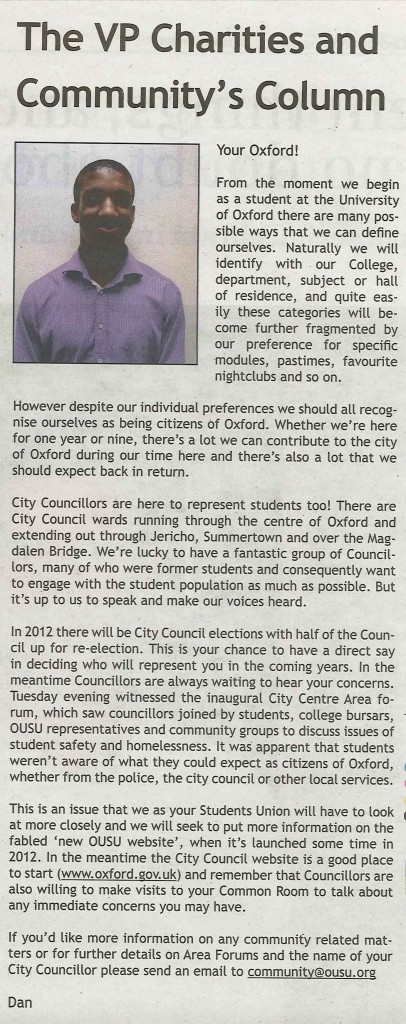 I had a meeting today with Tim Sadler, Executive Director City Services, and Ian Wright, Health Development Service Manager in Environmental Development. My colleagues Cllr Mark Mills and Cllr John Goddard also attended. The subject of the meeting was to discuss the problems and unintended consequences that are occurring with the City-wide licensing of Houses of Multiple Occupation (HMOs).
I had a meeting today with Tim Sadler, Executive Director City Services, and Ian Wright, Health Development Service Manager in Environmental Development. My colleagues Cllr Mark Mills and Cllr John Goddard also attended. The subject of the meeting was to discuss the problems and unintended consequences that are occurring with the City-wide licensing of Houses of Multiple Occupation (HMOs).
The discussion centred around the inflexibility of the Amenities and Facilities guide. I made a statement in full council about one of these issues a while back and two more have since arisen:
 In the first case we have a landlord who owns a few some modern executive houses (built in 2003/4) and has six tenants in each. They have plenty of bathrooms and toilets and a huge kitchen/lounge communal area with which the tenants are all happy. The problem is that for six tenants the dreaded document insists on an extra sink (or a sink and a dishwasher). The tenants are happy with one sink and don’t want either another sink or a dishwasher as this would reduce the cupboard space available to them for storage of their own personal food. The council is however insisting this work be done against the wishes both of the tenants and the landlord. This seems bonkers to me and only creates expense for the landlord that will inevitably be passed to the tenants in the next rent rise. See the ground floor plan on the left.
In the first case we have a landlord who owns a few some modern executive houses (built in 2003/4) and has six tenants in each. They have plenty of bathrooms and toilets and a huge kitchen/lounge communal area with which the tenants are all happy. The problem is that for six tenants the dreaded document insists on an extra sink (or a sink and a dishwasher). The tenants are happy with one sink and don’t want either another sink or a dishwasher as this would reduce the cupboard space available to them for storage of their own personal food. The council is however insisting this work be done against the wishes both of the tenants and the landlord. This seems bonkers to me and only creates expense for the landlord that will inevitably be passed to the tenants in the next rent rise. See the ground floor plan on the left.
The second case is even more bizarre. This is another house with six tenants. It has two bathrooms, each of which contain a toilet. You’d think that would be fine as the guide says that for 1-4 tenants one bathroom that contains a toilet is sufficient. But no – for six people if you have two bathrooms that both contain a toilet you also have to have a separate toilet. I understand that toiled has now been fitted after the issue was forced by the council – in a room that opens onto the kitchen, as one of the options the council suggested. The tenants hate it and never use it because of the smell into the kitchen and obvious hygiene issue. The work the council has imposed again strikes me as a waste of money and another inevitable rent rise. I really don’t see why the house can’t be treated as two groups of three people with a toilet-containing bathroom for each group.
My real issue with all this – both these cases, and the one I talked about at full council – is that these are groups of consenting and non-vulnerable adults sharing a house in a responsible and neighbourly way, with good relationships with their landlords. One of them even said to me: “As a landlord it is my policy to provide almost anything my tenants ask for. They are, after all, my customers. Thus, for example, if one tells me that their mattress is uncomfortable I don’t even check it myself. If they say it is uncomfortable…it is; so I change it. A quick phone call to my supplier who delivers and takes away the old one is easy and not very expensive. It makes good business sense to treat tenants well. I even turned out to fix a leak on Christmas Day. The tenants really do not want these things that Council officers are forcing us to do.”
The council is not protecting tenants in these cases – it is making problems and rent rises when there were no problems and everyone was happy. This is absolutely classic Labour behaviour: We’ll decide what’s best for you and make sure you have it – even if you don’t want it! This attempt to impose a one-size fits all policy on a complex situation where one set of guidelines clearly does not fit all situations is just causing unnecessary expense and waste for landlords and rent rises for tenants in a not exactly financially buoyant time of the economic cycle. Tenancies come in many different forms – some are room by room, some are whole-house, some have individual locks on rooms, some don’t.
I am of course all in favour of pursuing landlords who are negligent, don’t keep their properties in good repair and treat their tenants badly. These are not examples of that though – these tenants are financially capable working people who choose to live in high quality HMOs because they can’t afford to live in other way in Oxford with housing being in such short supply and so expensive. The landlords are providing essential accommodation for the people of Oxford and running decent, honest businesses doing it. In many cases this is to fund retirement – which seems entirely reasonable to me. If the landlords were not treating the tenants well they would move out!
There are two ends of the HMO spectrum in Oxford. At one end you have cases like those I’ve mentioned and at the other end you have run-down, damp, cold, overcrowded properties with vulnerable tenants with few choices. In my mind THESE are the places where council intervention is welcome and essential. But it really is not welcome or needed when landlord and tenants were happy and everything was fine – it is not the job of the council to disrupt perfectly good and safe arrangements between good landlords and non-vulnerable tenants. The Labour council should be arguing about numbers of cockroaches in some properties – not numbers of sinks or toilets in places where everyone is happy!
This was put rather well by one of the landlords at the last full council also:
“I would ask that the council focus on the highest risk properties and are not deflected by technical breaches of guidelines. That they use scarce resources and strong enforcement powers to protect vulnerable tenants and do not waste their energies on nitpicking …. Please avoid the temptation to consider being a landlord as a life choice of the more unsavoury end of the spectrum.”
She is absolutely right! I really want this council to accept that decent, honest landlords actually provide vital housing for many of Oxford’s students and young professionals. These good landlords want the bad landlords brought to account just as much as the council and we councillors do. The problem is that it feels like the council is currently treating all landlords like the enemy – when the council writes to them for example wouldn’t a few sentences in the letter acknowledging the important contribution they are making to the City’s housing needs be quite useful? It might achieve a much better relationship and much better outcomes.
Both of the landlords quoted above have told me they are seriously considering getting out of the business because it is too much hassle. Neither is young and both are providing good quality accommodation that Oxford desperately needs. I think it would be a real tragedy if the Labour council’s actions pushed these and others out of what is actually an essential business in Oxford thereby removing even more housing stock for young professionals and students who are an absolutely vital part of the economy of our City.
 Working with and engaging with our Universities, particularly the student body, is always a challenge. Not because anyone makes it difficult but I think because students come and go so quickly and because the senior people in the Students’ unions change every year. This academic year, Oxford University Student Union (OUSU) is lucky to have Daniel Stone (Dan) as its Vice President (Charities and Community). He works tirelessly to try to bring Students and City together and it’s great as a City Councillor to have a meaningful way to interface with the many students who live in Carfax Ward, the residents of which I represent!
Working with and engaging with our Universities, particularly the student body, is always a challenge. Not because anyone makes it difficult but I think because students come and go so quickly and because the senior people in the Students’ unions change every year. This academic year, Oxford University Student Union (OUSU) is lucky to have Daniel Stone (Dan) as its Vice President (Charities and Community). He works tirelessly to try to bring Students and City together and it’s great as a City Councillor to have a meaningful way to interface with the many students who live in Carfax Ward, the residents of which I represent!

 This is the annual event held at the Town Hall where councillors all get to bring two guests from local charities doing good in the area and one personal guest.
This is the annual event held at the Town Hall where councillors all get to bring two guests from local charities doing good in the area and one personal guest. I work for the University of Oxford and am a paid-up member of the Universities and Colleges Union. I’ve just set my work out of office message to read:
I work for the University of Oxford and am a paid-up member of the Universities and Colleges Union. I’ve just set my work out of office message to read:
 We have students in our street and they are mostly quiet, considerate and well-spoken. Occasionally we hear them late at night and occasionally they hear us. That’s a consequence of living in a crowded City with densely built accommodation – for me it’s a fair swap for all the wonderful things there are about Oxford. At last night’s Central South and West area forum there were many students present with positive contributions to make and showing genuine interest for local issues of concern. I was extremely impressed that OUSU, the Oxford University Student Union, is organising an-on street collection for the new Crisis Skylight Centre in Oxford this weekend. Students do many good things for our City and many volunteer for all sorts of community outreach. You can read lots about this on the site of the
We have students in our street and they are mostly quiet, considerate and well-spoken. Occasionally we hear them late at night and occasionally they hear us. That’s a consequence of living in a crowded City with densely built accommodation – for me it’s a fair swap for all the wonderful things there are about Oxford. At last night’s Central South and West area forum there were many students present with positive contributions to make and showing genuine interest for local issues of concern. I was extremely impressed that OUSU, the Oxford University Student Union, is organising an-on street collection for the new Crisis Skylight Centre in Oxford this weekend. Students do many good things for our City and many volunteer for all sorts of community outreach. You can read lots about this on the site of the 


 We had a meeting of the Lib Dem Group on the City Council today. We talked about our manifesto for next year and some of the excellent candidates we have lined up. The meeting was very positive and left me encouraged for the upcoming few months leading up to the elections in 2012.
We had a meeting of the Lib Dem Group on the City Council today. We talked about our manifesto for next year and some of the excellent candidates we have lined up. The meeting was very positive and left me encouraged for the upcoming few months leading up to the elections in 2012.
